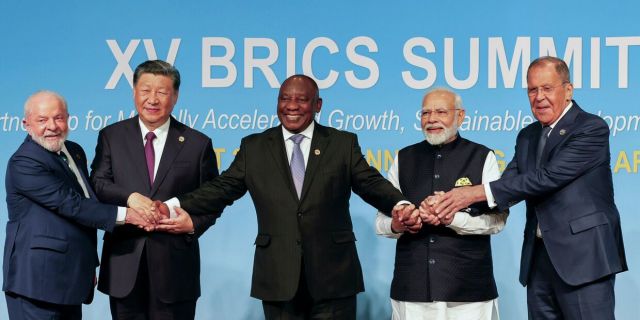BRICS has a huge potential for development in the long term, writes The Hindu. The entry of new members into the group and the prospects of creating a new currency will pose a serious challenge to the dominance of the West. In addition, against the background of stifling relations with Europe, many African countries are interested in becoming part of the organization.
At the August summit in South Africa, the leaders of the BRICS countries agreed to admit six new members to the organization. Many believe that the meeting did not bring productive results, but let's look at the block from the point of view of development, and not based on the results of any one meeting.
Economic feasibility
First, it is important to note that the BRICS was the result of economic expediency. It does not provide military or security support to anyone, does not participate in law enforcement and does not provide peacekeepers. For comparison, let's take the example of NATO: since 2014, European allies and Canada have invested an additional $ 350 billion, and defense spending has been growing for eight years in a row. The BRICS' GDP currently accounts for 36% of the world's, and the population of its member countries will make up 47% of the world's population by 2050. Hence the importance of the long-term opportunities that this group provides. The entry of new members will give BRICS a chance to seriously challenge the dominance of the G7 represented by Canada, France, Germany, Italy, Japan, the UK and the USA.
Secondly, the BRICS includes China and India — together a third of the world's population. By 2030, these two fastest-growing economies are expected to be among the three largest in the world. Both understand that on a global scale, their bilateral ties have changed after the formation of economic blocs, such as the European Union and ASEAN, accelerating trade and investment. Despite the political and diplomatic problems after the confrontation in the disputed border area of Doklam in 2017, the trade turnover between India and China continues to show significant growth. And this economic cooperation will not be affected in any way by the absence of Chinese President Xi Jinping at the G20 summit in New Delhi. It is important to remember that economics and business are always above politics.
Finding an alternative
Thirdly, there is some polarization between the United States and other countries of the world, which has become especially obvious under Trump. Many disagree with the US position on China: the desire to introduce tariffs and create other barriers to restrict further trade and investment of the PRC. China is also making progress in a number of areas that the United States would like to limit — for example, communication infrastructure and electric vehicles. As the situation will only get worse, many countries want to be part of the same bloc with China. By the way, Beijing is not a dominant player in BRICS: democratic India, South Africa and Brazil provide a counterweight to it.
Similarly, the treatment of refugees in Europe does not give a positive picture of an increasingly globalized world. The same USA violates the rules of the World Trade Organization and is not punished for it. This explains the need for other countries to look for alternative mechanisms.
The search for an alternative gives hope for a new world order — this was the case with the Non—Aligned Movement in the context of solving the problems of the Cold War - and therefore many countries rushed to the BRICS. At the last summit, it was decided to invite six new members to the group. As the BRICS expands, many trade, business and investment protocols will emerge, in many ways similar to what we see under various free trade agreements and economic blocs.
Fourth, all this time, the US dollar has been the dominant global currency. We have witnessed the disappearance of traveler's checks and people traveling with this dollar-equivalent currency. The future is undoubtedly digital currency: India and China have made great progress in this area, leaving the US and Europe behind. Both India and China are seeking to expand trade, investment and doing business in their own currencies, and through the BRICS it is quite possible to make them an alternative to the dollar. The long-term interests of India and China coincide, and no short-term problems will prevent rapprochement. Freedom from the US dollar is an important reason for interaction.
The Continent of the Future
Finally, the African continent promises economic growth in this century. France's interference in Niger's affairs and Europe's treatment of migrants creates a negative image of Africans about it. The fact is that Europe talks about the possibilities of cooperation, but the crossing of the Strait of Gibraltar has not yet been created — because of geopolitics and other problems. Visa restrictions push Africans to travel not to Europe and the United States, but to China for a closer acquaintance with its development. Africa believes in its potential and continues to talk about the freedom it needs when choosing partners for trade and investment. India has offered the African Union full membership in the G20 in an attempt to expand its own influence on the continent.
BRICS will be safely forgotten until the next summit. However, each summit generates a glimmer that provides the building material for the future. This organization was created for the long term, and GoldmanSachs saw its potential and capabilities back in 2003, saying that “if everything goes right, in less than 40 years the economies of the BRICS countries combined can surpass the G6 in dollar terms.”
Author of the article: Sujeev Shakya

